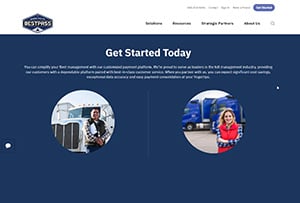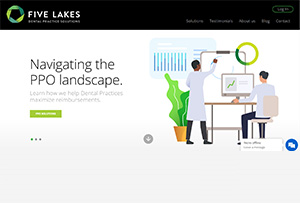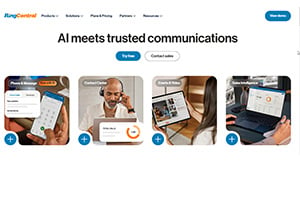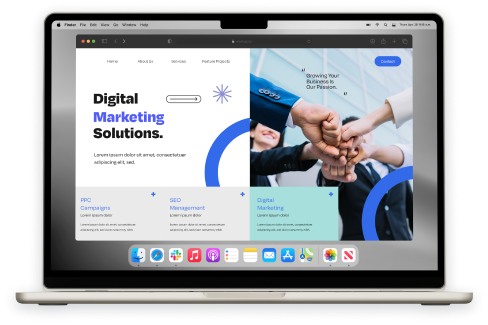Technical Transformation Services
Get higher ROI, smoother operations, and lower IT costs with technical transformation services tailored to your growth goals by Unity Communications.
🤙 Empowering Seamless Connectivity
Solving Real Business Challenges with Smart Technical Solutions
Solve industry-specific challenges with strategic technical transformation solutions that deliver measurable results.
Legacy System Modernization for Manufacturing Firms
Challenge: Your legacy systems slow you down, increase costs, and limit scalability.
Solution: We migrate legacy apps to the cloud, integrate IoT, and streamline production data to modernize infrastructure.
Result: You get 40% more uptime, 30% lower IT maintenance costs, and real-time monitoring.
API Integration for Cross-Platform Retail Operations
Challenge: Your eCommerce tools and POS systems don’t talk to each other—and you’re missing key customer insights.
Solution: We integrate your eCommerce, modernize POS, and unify customer data to improve decisions and boost engagement.
Result: You deliver a smoother experience, reduce cart abandonment by 25%, and grow lifetime customer value.
Scalable Cloud Infrastructure for Growing Startups
Solution: We migrate legacy apps to the cloud, integrate IoT, and streamline production data to modernize infrastructure.
Result: You get 40% more uptime, 30% lower IT maintenance costs, and real-time monitoring.
Secure Data Migration for Financial Services
Challenge: Your outdated systems increase risk and make compliance harder.
Solution: We modernize your systems with secure, compliant tech and automate reporting to simplify audits.
Result: You reduce audit prep time by 50%, meet compliance faster, and protect sensitive data.
Why Unity Communications? Smart, Scalable Solutions with Real ROI
Get efficient, affordable IT upgrades with Unity Communications. We deliver tailored technical transformation services that reduce costs, boost performance, and free you to focus on your core business.
Trusted by Hundreds of Small and Medium-Sized Businesses for Reliable, Results-Driven Outsourcing











🤙 Innovation Meets Efficiency
Tech Stack We Integrate and Optimize EVERYDAY
We integrate and optimize top tools and platforms to streamline your operations and drive growth.
CRMs
Data Visualization Tools
Email Marketing Platforms
E-commerce Platforms
Automation Platforms
Customer Support and Helpdesk Tools
Content Management and Publishing Tools
Payment Processing Solutions
Social Media Management Platforms
Ready to Take Your Business to the Next Level?
Start optimizing operations, reducing costs, and boosting ROI with tailored technical transformation services that give your business a competitive edge and lasting impact.
Custom Technical Services Built for Business Growth
From system modernization to cloud integration, Unity Communications delivers trusted, scalable technical services that drive real business results.
CRM Migration
Smarter CRM, better customer care
You get a custom-designed website built to match your brand and speak directly to your audience. We design for credibility, user flow, and engagement—resulting in stronger connections and better business outcomes.
Striking Features:
- Tailored to Your Brand and Business
- 100% Responsive Setup
- Built with SEO in Mind
- Conversion-driven layouts

CRM Integration
Unify teams with connected data
Connect your CRM to marketing, sales, and support tools for a fully unified workflow. We eliminate data silos, sync information across platforms, and automate processes, helping your team make faster, smarter decisions and deliver a more seamless customer experience.
Striking Features:
- Seamless Cross-Platform Integration
- Automated Workflows for Every Team
- Improved Decision-Making
- Consistent Customer Experiences

Website Migration
Upgrade your site without risk
Migrate your website to a new platform safely and efficiently. We ensure content accuracy, design consistency, SEO preservation, and minimal disruption during the transition to maintain performance while upgrading speed, security, and scalability.
Striking Features:
- Accurate content transfer
- Speed and security improvements
- SEO and content structure maintained
- Smooth migration and minimal downtime
- Easy-to-manage backend with ongoing support

Tech Stack/ System Integration
Streamline systems, boost output
Integrate your tools into one ecosystem. We bridge gaps between systems, reduce manual tasks, and improve data flow, giving your team a more efficient way to collaborate, access information, and scale operations with ease.
Striking Features:
- Unified workflows across your platforms
- Less manual work, more automation
- Consistent, real-time data flow
- Scalable and flexible infrastructure

API Development and Integration
Connect tools, work smarter
Build secure, scalable APIs that connect your platforms and streamline operations. From custom development to third-party integrations, we automate data sharing, unlock functionality, and future-proof your tech stack for continuous innovation.
Striking Features:
- Custom integrations for your unique workflows
- Clean, well-documented API architecture
- Real-time data sharing across systems
- Secure, scalable, and automation-ready

Digital Workflow Automation
Save hours without risking quality
Automate repetitive tasks across departments using Zapier, Power Automate, or custom scripts. We design intelligent workflows that increase speed, reduce human error, and allow your team to focus on strategic work instead of routine processes.
Striking Features:
- Smart workflows tailored to your operations
- Zapier, Power Automate, or custom-built logic
- Reliable execution with fewer manual steps
- Scalable systems that grow with your team

Data Migration and Transformation
Clean, usable data that performs
Migrate and transform your data accurately and confidently. We clean, organize, and reformat legacy data for new systems—ensuring consistency, compliance, and usability—so your business can run smoother and gain better insights from day one.
Striking Features:
- Structured migration tailored to your systems
- Legacy cleanup and transformation
- Accurate, secure, and audit-ready results
- Actionable data from day one

Business Intelligence and Analytics Setup
Find what works and what doesn’t
Turn raw data into actionable business insights. We implement BI dashboards, custom reports, and analytics frameworks to help you monitor performance, identify trends, and make smarter, data-backed business decisions.
Striking Features:
- Dashboards and reports built for your goals
- Custom analytics across tools and teams
- Clean, reliable data at the core
- Scalable setup for growing needs

DevOps Optimization
Accelerate development, improve software quality
Accelerate development and improve software quality with DevOps best practices. We implement CI/CD pipelines, automate testing, and optimize infrastructure, helping your teams ship faster, reduce bugs, and stay ahead of business and user demands.
Striking Features:
- CI/CD pipelines tailored to your stack
- Automated testing for higher-quality code
- Optimized infrastructure for performance and scale
- Continuous improvement across teams

CRM Migration
Smarter CRM, better customer care
You get a custom-designed website built to match your brand and speak directly to your audience. We design for credibility, user flow, and engagement—resulting in stronger connections and better business outcomes.
Striking Features:
- Tailored to Your Brand and Business
- 100% Responsive Setup
- Built with SEO in Mind
- Conversion-driven layouts

CRM Integration
Unify teams with connected data
Connect your CRM to marketing, sales, and support tools for a fully unified workflow. We eliminate data silos, sync information across platforms, and automate processes, helping your team make faster, smarter decisions and deliver a more seamless customer experience.
Striking Features:
- Seamless Cross-Platform Integration
- Automated Workflows for Every Team
- Improved Decision-Making
- Consistent Customer Experiences

Website Migration
Upgrade your site without risk
Migrate your website to a new platform safely and efficiently. We ensure content accuracy, design consistency, SEO preservation, and minimal disruption during the transition to maintain performance while upgrading speed, security, and scalability.
Striking Features:
- Accurate content transfer
- Speed and security improvements
- SEO and content structure maintained
- Smooth migration and minimal downtime
- Easy-to-manage backend with ongoing support

Tech Stack/ System Integration
Streamline systems, boost output
Integrate your tools into one ecosystem. We bridge gaps between systems, reduce manual tasks, and improve data flow, giving your team a more efficient way to collaborate, access information, and scale operations with ease.
Striking Features:
- Unified workflows across your platforms
- Less manual work, more automation
- Consistent, real-time data flow
- Scalable and flexible infrastructure

API Development and Integration
Connect tools, work smarter
Build secure, scalable APIs that connect your platforms and streamline operations. From custom development to third-party integrations, we automate data sharing, unlock functionality, and future-proof your tech stack for continuous innovation.
Striking Features:
- Custom integrations for your unique workflows
- Clean, well-documented API architecture
- Real-time data sharing across systems
- Secure, scalable, and automation-ready

Digital Workflow Automation
Save hours without risking quality
Automate repetitive tasks across departments using Zapier, Power Automate, or custom scripts. We design intelligent workflows that increase speed, reduce human error, and allow your team to focus on strategic work instead of routine processes.
Striking Features:
- Smart workflows tailored to your operations
- Zapier, Power Automate, or custom-built logic
- Reliable execution with fewer manual steps
- Scalable systems that grow with your team

Data Migration and Transformation
Clean, usable data that performs
Migrate and transform your data accurately and confidently. We clean, organize, and reformat legacy data for new systems—ensuring consistency, compliance, and usability—so your business can run smoother and gain better insights from day one.
Striking Features:
- Structured migration tailored to your systems
- Legacy cleanup and transformation
- Accurate, secure, and audit-ready results
- Actionable data from day one

Business Intelligence and Analytics Setup
Find what works and what doesn’t
Turn raw data into actionable business insights. We implement BI dashboards, custom reports, and analytics frameworks to help you monitor performance, identify trends, and make smarter, data-backed business decisions.
Striking Features:
- Dashboards and reports built for your goals
- Custom analytics across tools and teams
- Clean, reliable data at the core
- Scalable setup for growing needs

DevOps Optimization
Accelerate development, improve software quality
Accelerate development and improve software quality with DevOps best practices. We implement CI/CD pipelines, automate testing, and optimize infrastructure, helping your teams ship faster, reduce bugs, and stay ahead of business and user demands.
Striking Features:
- CI/CD pipelines tailored to your stack
- Automated testing for higher-quality code
- Optimized infrastructure for performance and scale
- Continuous improvement across teams

From Legacy Systems to Data-Driven Success: Understanding Technical Transformation
Technical transformation services modernize information systems to boost business agility and intelligence. By upgrading outdated systems to modern, data-driven operations, companies improve efficiency, streamline workflows, and enhance decision-making.
This shift empowers businesses to adapt quickly, leverage valuable insights, and deliver exceptional customer experiences. However, a successful transformation requires a strategic plan and expert support, often from trusted outsourcing partners.
This article explores the essential components of technical transformation, helping you understand how these services can strengthen your operations. Keep reading to discover how modernization and outsourcing drive long-term success.

Understanding technical transformation and its business impact
Technical transformation is the transition from obsolete systems to contemporary, data-driven procedures. This progression enables firms to increase operational efficiency, harness data, and provide exceptional customer experiences. Technical transformation services assist businesses in remaining competitive and adaptive.
Defining legacy systems and their limitations
Legacy systems are old software or hardware that can no longer meet enterprise needs. They stifle growth and make it difficult for businesses to remain adaptable. Common issues with these systems include:
- Limited integration. Older platforms struggle to integrate with modern technology, resulting in isolated processes.
- Expensive maintenance expenditures. Maintaining obsolete systems necessitates periodic repairs and upgrades, resulting in unnecessary financial pressure.
- Data silos. Old systems can isolate information, limiting cooperation and delaying decision-making.
- Low scalability. Legacy systems typically cannot meet changing business requirements.
These limitations underscore the urgent need for businesses to move beyond outdated infrastructure. It sets the stage for a closer look at how modern solutions can drive efficiency and growth.
Characteristics of data-driven ecosystems
Data-driven ecosystems collect and consolidate data to enable smarter, faster decision-making. This approach allows companies to respond quickly and tailor customer interactions effectively. Key features include:
- Consolidated data sources. All information is accessible in one location, increasing reach and operational efficiency.
- Real-time analytics. They generate immediate insights for speedier responses and more precise forecasts.
- Flexible infrastructure. Cloud-based solutions scale with the business without complicating processes and adapt to changing needs.
These characteristics highlight how data-driven ecosystems empower organizations to operate with agility and precision. It paves the way for exploring how digital transformation makes this ecosystem possible.
The strategic value of technical transformation
Moving from legacy systems to a data-driven approach helps firms to match technology with their objectives better and thrive in a digital-first environment. Through technical transformation services, they can achieve:
- Improved decision-making. Business owners can swiftly tap into essential data to make timely and educated decisions.
- Increased agility. Companies can respond swiftly to market changes, staying ahead of competitors.
- Long-term resilience. A more adaptable, future-ready information technology (IT) infrastructure supports long-term growth in dynamic markets.
These strategic advantages underscore why technical transformation is not just an IT upgrade. It’s a business imperative that prepares organizations for sustainable success in an evolving digital landscape.
Why move from legacy to data-driven?
Technical transformation is critical for today’s companies that want to increase productivity, engage customers, and stay competitive. Moving from antiquated systems to a data-centric infrastructure can quickly give businesses insights that accelerate growth.
The following further explains its benefits:
Avoid unnecessary costs and limitations
Maintaining old systems can be costly and wasteful, limiting expansion and adaptability. Outdated systems impose significant financial and operational constraints on firms, with continuous difficulties including:
- Costly repairs. Legacy systems require frequent repairs, incurring higher maintenance expenses.
- Operational inefficiencies. Manual processes and workarounds slow down operations and lower productivity.
- Missed potentials. Implementing new technology is challenging, as outdated systems limit growth potential.
- Slower innovation. Legacy systems lack the versatility to allow companies to adopt innovative solutions quickly.
Eliminating these costly limitations paves the way for greater innovation, efficiency, and growth. Modernization is a clear path to unlocking long-term business value.
Meet evolving customer expectations
Today’s consumers want effortless, personalized experiences. Data-driven ecosystems consolidate information to help firms meet these objectives by providing:
- Personalized interactions. Real-time data allows for customized offerings and recommendations based on individual interests.
- Fast service. Instant access to customer information leads to quicker responses, increasing satisfaction.
- Consistency. Integrated systems can consolidate customer perspectives to design a consistent experience across all touchpoints.
- Timely assistance. Anticipating client requirements with data-driven insights improves loyalty and lasting satisfaction.
Modern customers expect fast, seamless, and tailored experiences. Meeting these expectations requires the right tools, and data-driven ecosystems deliver exactly that.
Stay competitive and innovative
To be competitive, businesses must change swiftly and accept new technologies. Organizations can remain nimble and dynamic by incorporating the latest technologies through technical transformation services. They can:
- Adopt new tools effectively. Current platforms can quickly sync with developing technological devices.
- Keep ahead of competitors. Companies that use real-time data and adaptability have a competitive advantage in fast-moving marketplaces.
- Promote growth. A future-proof IT architecture is critical for expanding operations and preserving reliability.
- Improve decision-making. Precise, timely data informs decisions, improving company outcomes and strategic actions.
Staying competitive today means keeping pace with change and embracing innovation. Technical transformation services make this possible by equipping businesses with the tools to grow, adapt, and lead.
Key pillars of technical transformation
Businesses need modern, efficient systems to compete in the ever-changing market. Outdated technology slows operations, limits flexibility, and reduces customer satisfaction. A well-executed technical transformation service integrates systems, boosts productivity, streamlines workflows, and enhances decision-making.
However, a successful transition relies on four key components:
1. CRM migration and integration
Scattered customer data hampers sales and marketing. Migrating and integrating CRM platforms can centralize information, boost visibility, track leads, and improve collaboration. It results in:
- Stronger sales alignment. When sales and marketing teams use the same data source, they can avoid discrepancies and redundancy and improve lead conversion. A unified CRM helps prospects receive the proper engagement on time.
- Automated processes. Manual data entry slows efficiency. CRM automation handles lead tracking, follow-ups, and reporting, freeing teams for high-value tasks. Intelligent workflows boost speed and accuracy.
- Better customer interactions. An integrated CRM consolidates customer interactions, offering a complete view of client history. Personalized engagement boosts customer satisfaction and strengthens relationships.
- Faster decision-making. Real-time access to updated customer data helps decision-makers respond quickly, refine strategies, allocate resources, and anticipate trends.
- Unified reporting. A centralized CRM consolidates sales, marketing, customer, and performance data into a single dashboard, providing actionable insights for strategic decision-making.
CRM migration and integration eliminate data silos and bring customer insights into one place. This centralized approach empowers teams to work smarter, connect better with customers, and drive faster results.
2. Tech stack integration
A well-executed technical transformation service connects marketing automation, analytics, enterprise resource planning (ERP), and customer support tools. Without integration, these applications operate in silos, hindering collaboration and slowing workflows. The process:
- Eliminates duplicate work. Disconnected systems require manual data entry, increasing errors and inefficiencies. Integrated systems sync data across platforms to reduce redundancy and enhance accuracy.
- Improves analytics. Without integration, data is scattered across tools, limiting visibility. A connected tech stack consolidates them for more accurate analytics and actionable insights.
- Enhances productivity. Switching between multiple platforms disrupts workflow efficiency. Integrated tools allow employees to access everything they need in one place, reducing wasted time and improving overall output.
- Boosts collaboration. Teams working with different software often struggle to coordinate efforts. An integrated ecosystem fosters seamless communication through shared access to essential data, making cross-functional partnerships more effective.
- Enhances system reliability. Integrated technology reduces downtime caused by system conflicts, prevents disruptions, and supports business continuity efforts.
Tech stack integration connects disconnected tools into one cohesive system. This unified approach streamlines operations, enhances collaboration, and strengthens reliability across the business.
3. Data cleansing and enrichment
An effective technical transformation service strengthens data integrity and refines customer targeting, operational efficiency, and business intelligence. Outdated or inaccurate data causes poor decisions, revenue loss, and missed opportunities. The process:
- Removes duplicates. Duplicate records clutter databases and confuse, hindering the accurate tracking of customer interactions. Removing redundant entries improves clarity so teams can make confident, data-driven decisions.
- Updates outdated records. Businesses update contact and operational details over time. Keeping records current prevents miscommunication, failed deliveries, and missed opportunities.
- Validates inputs. Incorrect formatting, misspellings, and inconsistent data entry create processing errors. Data validation processes identify and correct inaccuracies before they affect reporting, compliance, or customer interactions.
- Enriches information. Basic contact details offer limited insights. Adding attributes, including industry, purchase history, or engagement behavior, enhances segmentation, personalization, and outreach.
- Standardizes formats. Inconsistent data structures result in processing errors. Standardizing inputs across systems enhances usability, reporting accuracy, and system interoperability.
Data cleansing and enrichment ensure business data is accurate, complete, and usable. This process boosts decision-making, enhances personalization, and supports more effective operations.
4. Custom API and interoperability
Different systems often fail to communicate, causing inefficiencies and bottlenecks. Custom application programming interfaces (APIs) bridge gaps, connect apps, automate workflows, and enhance user experiences. They:
- Promote smooth integration. Off-the-shelf software might not work with legacy or niche systems. Custom APIs connect disparate platforms for seamless data exchange.
- Reduce manual tasks. APIs automate data transfer and eliminate manual entry and errors. Real-time sync lets employees focus on strategic tasks.
- Support scalability. Business needs evolve, requiring flexible systems that grow alongside operations. Custom APIs adapt to new tools and technologies without requiring a complete system overhaul, simplifying long-term scalability.
- Improve security. Vulnerabilities increase during data transfers. Custom APIs incorporate authentication protocols and encryption measures to protect sensitive information from breaches and unauthorized access.
- Optimize user experience. Smooth API integrations enhance application functionality, reduce platform friction, and improve usability for employees and customers.
By utilizing technical transformation services, businesses enhance efficiency, strengthen customer relationships, and increase agility. Modernizing systems unlocks operational potential, positioning companies for long-term growth and success.
Overcoming challenges and measuring impact
Challenges are unavoidable as firms embrace a digitization process. A correctly implemented technical transformation service enables enterprises to assess advancement continuously, stay on target, and change as needed. By tracking key KPIs, businesses can justify their investments and show stakeholders the benefits of the transformation.
Below are the common transition challenges and their solutions:
Addressing resistance and technical debt
Resistance to change, antiquated code, and traditional methods challenge the digital revolution. To combat this, companies can involve key stakeholders early, opening communication about the transition’s benefits and expectations. Systematically addressing technical concerns, such as obsolete integrations, can make the shift to contemporary systems easier.
Additionally, businesses can provide training and support to lessen resistance and promote smoother adoption. They can also upgrade or replace legacy systems to meet modern requirements.
Ensuring data security and compliance
Data security and regulatory compliance are top priorities for a digital transformation. Preserving the integrity of sensitive data is imperative. Investing in robust safety measures, such as encryption and authentication procedures, can maintain confidence and meet industry standards.
Regular audits and ongoing employee training on security best practices can reduce risks and avoid data breaches.
Tracking metrics and continuous improvement
Key performance indicators (KPIs) can assess the effectiveness of technical modernization projects. Companies can regularly track KPIs to analyze success, including system uptime, user uptake, and operational efficiency.
They can also monitor adoption rates and feedback from end users and measure increases in operational efficiency and cost savings. Reviewing quarterly outcomes can refine plans and processes.
How BPO helps technical transformation services
What is BPO, and how does it contribute to technical transformation services? Business process outsourcing (BPO) allows businesses to partner with service providers to modernize IT infrastructure and optimize operations with data-driven strategies.
Outsourcing IT modernization for scalability and efficiency
Service providers help organizations upgrade legacy systems and migrate to the cloud, offering a scalable infrastructure that grows with the company. They provide solutions that enhance flexibility without overburdening internal teams, maximizing business growth with IT outsourcing, while allowing critical business functions to run smoothly.
Data migration and management through BPO services
One of the technical transformation services is data migration, offering smooth transitions from legacy to modern systems to minimize downtime and reduce the risk of errors. With expert guidance, firms experience improved data integrity and continuity throughout the migration process. BPO in data analytics also enhances the ability to extract actionable insights from data.
CRM management and integration with external expertise
Outsourcing CRM integration streamlines sales pipelines and marketing automation. This approach allows enterprises to manage customer relationships better and align sales and marketing efforts. The impact of BPO on CRM is evident in improved operational efficiency and customer satisfaction.
Business process outsourcing for data-driven operations
BPO firms optimize workflows, improve decision-making, and enhance customer service by implementing advanced analytics, AI, and real-time data strategies. These data-driven solutions empower organizations to make smarter decisions and boost operational performance. BPO and digital transformation play a vital role in this shift.
Security and compliance in outsourced processes
Service providers implement strong security measures and comply with industry regulations to safeguard sensitive data. By partnering with experts in BPO security, businesses can rest assured that their information remains protected and compliance standards are met.
The bottom line
Technical transformation services assist firms in transitioning from old systems to data-driven ecosystems, a crucial strategy for increasing market competitiveness. This pivotal move enhances decision-making, agility, and customer happiness.
Companies establish a flexible, future-ready infrastructure by integrating CRM platforms, streamlining data, and improving workflows. Organizations can optimize data-driven operations through careful planning, practical implementation, and continual refining.
Ready to transform your business? Let’s connect and discuss how we can help your business embrace this strategic change for sustained growth and innovation.


Get Started with 5 Hours of Completely FREE digital marketing service. No strings attached.
Looking to Meet Now? Schedule A Meeting Today
Frequently Asked Questions and Answers
Let’s Connect and Explore
Looking to Meet Now? Schedule A Meeting Today
Ready to grow better? Schedule a FREE discovery call
Get a FREE Website Audit
Get a full website audit—100% free. We’ll evaluate SEO, performance, and UX to reveal hidden issues and growth opportunities. Turn your website into a conversion engine.
Take the First Step to Website Excellence
Claim Your Free Website Audit Now
Pure Benefits For You:
- SEO Performance Review
- Design & User Experience Analysis
- Site Speed & Performance Check
- Actionable Recommendations


